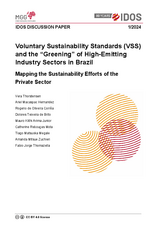Voluntary Sustainability Standards (VSS) and the “greening” of high-emitting industry sectors in Brazil: mapping the sustainability efforts of the private sector
Thorstensen, Vera / Ariel Macaspac Hernandez / Rogerio de Oliveira Corrêa / Dolores Teixeira de Brito / Mauro Kiithi Arima Junior / Catherine Rebouças Mota / Tiago Matsuoka Megale / Amanda Mitsue Zuchieri / Fabio Jorge ThomazellaDiscussion Paper (1/2024)
Bonn: German Institute of Development and Sustainability (IDOS)
ISBN: 978-3-96021-225-6
DOI: https://doi.org/10.23661/idp1.2024
Price: 6 €
The work aimed to analyse the sustainability efforts – the greening – of five industry sectors in Brazil: aluminium, chemical, steel, cement, and oil and gas. These sectors were chosen because they are the industries with the highest carbon emissions. The research sought to verify the sustainability measures adopted by business and industry actors, with special emphasis on the use of Voluntary Sustainability Standards and ESG values. In order to verify the information provided by the companies, the documents that informed the measures taken by the companies and the numbers supporting their results were always sought out and explained in the text. The conclusions were that the sectors, guided by industry associations, have adopted a broad set of sustainability measures. The results of these measures, however, sometimes lack proof and sometimes lead to sporadic conduct, contrary to the precepts of environmental and social sustainability.
Resumo (Portuguese)
O trabalho teve como objetivo analisar os esforços de sustentabilidade de cinco setores da indústria brasileira: alumínio, químico, aço, cimento e petróleo e gás. Os setores foram escolhidos por serem altamente poluentes. A pesquisa buscou verificar as iniciativas de sustentabilidade dos setores, com especial ênfase no uso de normas voluntárias de sustentabilidade e de padrões ESG. A fim de comprovar a veracidade das informações prestadas pelas empresas, buscou-se sempre a identificação de documentos que formalizassem as ações das empresas e de números que comprovassem seus resultados. As conclusões foram que os setores, orientados por suas associações, adotam um conjunto amplo de medidas de sustentabilidade. Essas ações, entretanto, por vezes carecem de comprovação de resultados e não impedem a adoção esporádica de condutas contrárias aos preceitos de sustentabilidade ambiental e social.


